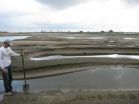(Press-News.org) Conversations about wartime atrocities often omit certain details. According to research published in Psychological Science, a journal of the Association for Psychological Science, these omissions can lead people to have different memories for the event depending on social group membership.
"We started thinking about this project around the time when stories began to emerge in the popular media about atrocities committed by American soldiers in Iraq and Afghanistan," says lead researcher Alin Coman, psychological scientist at Princeton University.
"We wanted to scientifically investigate the effect of hearing about these incidents at the level of the American public," Coman notes. "How will people remember these atrocities? Will they tend to suppress the memory to preserve the positive view of their in-group? Will they conjure potential pieces of information to justify the atrocities?"
As people discuss events, such as abuses at Abu-Ghraib and Guantanamo, the stories are often reworked over time – Coman and colleagues at the John Jay College of Criminal Justice and New School for Social Research wondered whether this reworking might alter people's memories for the events.
Linking work on moral psychology and cognitive psychology, the researchers hypothesized that listeners would more easily forget unrepeated justifications for atrocities that are supposedly perpetrated by someone from an outside group, but would be motivated to remember the unrepeated justifications when the perpetrators are members of their own group – possibly as a way of shielding in-group members from moral responsibility.
To test their hypothesis, the researchers asked 72 American participants to read stories about perpetrators of war atrocities who were either American soldiers (in-group) or Afghan soldiers (out-group). The stories were drawn from or constructed to resemble actual media reports, and the atrocities in the stories were accompanied by a justifying action – for example, the perpetrator submerged an insurgent's head in cold water because he had withheld information about an upcoming attack.
Participants studied the stories and, after a 10-minute distractor task, they watched a video of another person recounting the atrocities – but not repeating the justifications – from two of the four stories that had been presented. After another distractor task, participants were asked to recall as much as they could about each of the four stories they had studied.
The results showed that participants were more likely to forget justifications for the atrocities committed by Afghan soldiers that had been recounted in the videos compared to justifications for the atrocities that hadn't been recounted. The results indicate that hearing the stories repeated without the original justifications led participants to forget those justifications, just as the researchers expected.
But participants showed no memory impairment for unrepeated justifications when the perpetrator was American. That is, in-group membership made participants more likely to remember the reasons why the soldier committed the act, even though they had not been reminded of those reasons in the video.
"What we learn from this research is that moral disengagement strategies are fundamentally altering our memories," explains Coman. "More specifically, these strategies affect the degree to which our memories are influenced by the conversations we have with one another."
These findings are important, the researchers argue, because the ways in which people recall justifications could "influence attitudes and beliefs, the willingness to pay reparations, and the level of aggression toward out-groups."
INFORMATION:
Co-authors on the study include Charles B. Stone of John Jay College of Criminal Justice and Emanuele Castano and William Hirst of the New School for Social Research.
The research was supported by National Science Foundation Grant BCS-0819067.
For more information about this study, please contact: Alin Coman at acoman@princeton.edu.
The article abstract is available online: http://pss.sagepub.com/content/early/2014/04/16/0956797614531024.abstract
The APS journal Psychological Science is the highest ranked empirical journal in psychology. For a copy of the article "Justifying Atrocities: The Effect of Moral-Disengagement Strategies on Socially Shared Retrieval-Induced Forgetting" and access to other Psychological Science research findings, please contact Anna Mikulak at 202-293-9300 or amikulak@psychologicalscience.org.
People selectively remember the details of atrocities that absolve in-group members
2014-04-21
ELSE PRESS RELEASES FROM THIS DATE:
A new key to unlocking the mysteries of physics? Quantum turbulence
2014-04-21
The recent discovery of the Higgs boson has confirmed theories about the origin of mass and, with it, offered the potential to explain other scientific mysteries.
But, scientists are continually studying other, less-understood forces that may also shed light on matters not yet uncovered. Among these is quantum turbulence, writes Katepalli Sreenivasan, an NYU University Professor, in a special issue of Proceedings of the National Academy of Sciences.
Sreenivasan's introductory analysis, written with issue co-editors Carlo Barenghi of Newcastle University and Ladislav ...
Mental illness not usually linked to crime, research finds
2014-04-21
WASHINGTON — In a study of crimes committed by people with serious mental disorders, only 7.5 percent were directly related to symptoms of mental illness, according to new research published by the American Psychological Association.
Researchers analyzed 429 crimes committed by 143 offenders with three major types of mental illness and found that 3 percent of their crimes were directly related to symptoms of major depression, 4 percent to symptoms of schizophrenia disorders and 10 percent to symptoms of bipolar disorder.
"When we hear about crimes committed by people ...
Teachers' scare tactics may lead to lower exam scores
2014-04-21
WASHINGTON -- As the school year winds down and final exams loom, teachers may want to avoid reminding students of the bad consequences of failing a test because doing so could lead to lower scores, according to new research published by APA.
"Teachers are desperately keen to motivate their students in the best possible way but may not be aware of how messages they communicate to students around the importance of performing well in exams can be interpreted in different ways," said lead author David Putwain, PhD, of Edge Hill University in Lancashire, England.
The study, ...
Ginseng can treat and prevent influenza and RSV, researcher finds
2014-04-21
ATLANTA--Ginseng can help treat and prevent influenza and respiratory syncytial virus (RSV), a respiratory virus that infects the lungs and breathing passages, according to research findings by a scientist in Georgia State University's new Institute for Biomedical Sciences.
In a recent issue of Nutrients and an upcoming publication of the International Journal of Molecular Medicine, Sang-Moo Kang reports the beneficial effects of ginseng, a well-known herbal medicine, on human health.
Kang's primary research focuses on designing and developing effective vaccines against ...
New material coating technology mimics nature's lotus effect
2014-04-21
VIDEO:
This movie explains the new coating material.
Click here for more information.
Ever stop to consider why lotus plant leaves always look clean? The hydrophobic – water repelling – characteristic of the leaf, termed the "Lotus effect," helps the plant survive in muddy swamps, repelling dirt and producing beautiful flowers.
Of late, engineers have been paying more and more attention to nature's efficiencies, such as the Lotus effect, and studying its behavior in order ...
Birthplace of the domesticated chili pepper identified in Mexico
2014-04-21
Central-east Mexico gave birth to the domesticated chili pepper — now the world's most widely grown spice crop — reports an international team of researchers, led by a plant scientist at the University of California, Davis.
Results from the four-pronged investigation — based on linguistic and ecological evidence as well as the more traditional archaeological and genetic data — suggest a regional, rather than a geographically specific, birthplace for the domesticated chili pepper. That region, extending from southern Puebla and northern Oaxaca to southeastern Veracruz, ...
Study: Centuries of sand to grow Mississippi Delta
2014-04-21
The wetlands of the Mississippi River Delta are slowly sinking and rapidly eroding, but new research from Rice University and the University of South Carolina has found the river's supply of sand -- the material engineers most need to rebuild the delta -- will stay constant for centuries.
The new study, which appears online this week in Nature Geoscience, is encouraging news for scientists and government officials who are working to shore up southeastern Louisiana's rapidly disappearing wetlands. The delta sinks each year as its soil settles and becomes more compact. ...
A protein required for integrity of induced pluripotent stem cells
2014-04-21
Cell reprogramming converts specialised cells such as nerve cells or skin cells towards an embryonic stem cell state. This reversal in the evolutionary development of cells also requires a reversal in the biology of telomeres, the structures that protect the ends of chromosomes; whilst under normal conditions telomeres shorten over time, during cell reprogramming they follow the opposite strategy and increase in length.
A study published today in the journal Stem Cell Reports, from the Cell Publishing Group, reveals that the SIRT1 protein is needed to lengthen and maintain ...
New approach may help manage the most troubling symptoms of dementia, lessen use of drugs
2014-04-21
ANN ARBOR, Mich. — A new approach to handling agitation, aggression and other unwanted behaviors by people with dementia may help reduce the use of antipsychotics and other psychiatric drugs in this population, and make life easier for them and their caregivers, a team of experts says.
Publishing their recommendations under the easy-to-remember acronym of "DICE", the panel of specialists in senior mental health hope to spark better teamwork among those who care for dementia patients at home, in residential facilities and in hospitals and clinics.
In fact, the federal ...
Philanthropy at Work and Home: Involving (Our) Kids in Volunteerism and Fundraising
2014-04-21
Kids will be more than just observers at the Women in Development of Mercer County breakfast meeting Thursday, April 24 at the Fedora Cafe at 2633 Main St.
The breakfast meeting, from 8:30-10 am, will focus on ways to effectively engage children, tweens and teens in volunteerism and philanthropy.
Elian Rubin, a 7th Grade Student at John Witherspoon Middle School in Princeton, will speak about his experiences in fundraising. Elian is an active volunteer with SAVE, A Friend to Homeless Animals, Princeton Boy Scout Troop 43 and his school's Do Something Club. In addition ...


